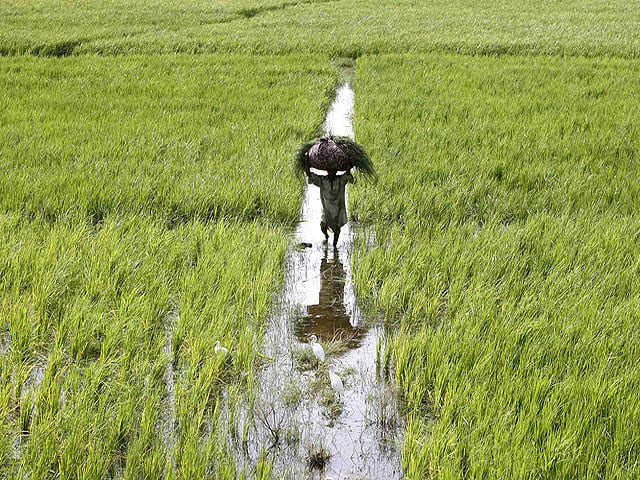Move away from agriculture, Chinese economist advises
Says Pakistan can achieve 10% GDP growth; poverty is not its destiny

PHOTO: REUTERS
Sectors where China is losing its competitive advantage can become Pakistan’s latent advantage, said the professor, also a former vice-president of the World Bank and author of 24 books. He said that light manufacturing industries that have been declared “sunset industries” in China can be relocated to Pakistan.
Boosting agriculture: Experts call for collaborative efforts
Pakistan has maintained a decent economic growth rate but it is still relatively poor, said professor Lin, while highlighting flaws of Pakistan’s economic structure and the way forward for the economy of 200 million people.
His economic development theory gives a centre stage to the government as a facilitator aimed at overcoming externality and coordination challenges during the transformation phase.
China will move from labour-intensive to capital-intensive industry and this will free 85 million jobs that will relocate to other countries, said the professor. “China’s upgrading to higher industries will leave a huge space for Pakistan to enter a labour-intensive industrialisation development phase”, he added.
“Poverty is not the destiny of Pakistan,” said Professor Lin while delivering a lecture on how to achieve dynamic growth at the Planning Commission.
“If Pakistan can capture this opportunity, it will be able to grow at 10% annually for 30 or more years and become a high middle income or even high income country,” said Professor Lin, one of China’s foremost economists.
Pakistan’s advantage
According to Pakistani thinkers, the country’s current economic structure is highly flawed, as more than half of the total national output is coming from the services sector that is not labour intensive.
Pakistan grew at 4.7% in the last fiscal year, which was not sufficient to create enough jobs to absorb the youth bulge. Its growth is job exclusive and has widened the gap between the rich and poor, according to independent economists.
The Chinese professor said that the two types of Chinese investments could come to Pakistan -infrastructure and export-oriented sectors. He said that Pakistan’s businesspersons could enter into joint ventures with Chinese partners.
The private sector of Pakistan has to change its mindset as days of protectionism are over, said Ahsan Iqbal, Federal Minister for Planning, Development and Reform. Iqbal said that if Pakistan remains unable to take advantage from 85 million dying jobs in China, these jobs would shift to other countries like Vietnam and Bangladesh.
Pakistan’s journey to success
Professor Lin suggested six steps for Pakistan to indentify sectors of latent competitive advantage. The first step is to find fast growing countries with up to 200% higher per capita income or about 30 years ago had similar per capita income. He said in 1979 China’s per capita income was 30% less than that of Pakistan but today Beijing’s per capita income was 550% more than of Pakistan.
He said that in the next step, the government should see if some private sector firms are already in these industries and should then facilitate them by removing constraints. In step three, the government should invite foreign firms to invest in sectors where the local firms are not working.
Problems riddle agriculture sector, say experts
In step four, the government should also pay attention to spontaneous self-discovery by private enterprises and give support to scale up successful private innovations in new industries.
In the second last step, Pakistan with poor infrastructure and bad business environment should set up special economic zones or industrial parks to overcome barriers to firm entry, attract foreign direct investment and encourage industrial clusters.
In the last step, the government may compensate pioneer firms identified above with tax incentive for a limited period, direct credits for investments and give access to foreign exchange.
The long-term development of China-Pakistan Economic Corridor also revolves around development of special economic zones.
Chinese industries willing to relocate to Pakistan provide excellent opportunity for Pakistan to grow at a faster pace, said Dr Ashfaque Hasan Khan, one of the leading economists of the country.
Use of new technologies to help reduce agri cost
Professor Lin said that for reducing transaction cost in the infrastructure sector Pakistan needs to improve customs, roads and rail networks. He also advised that the federal and provincial authorities should listen to the foreign investors in order to address their concerns.
Published in The Express Tribune, April 5th, 2017.
Like Business on Facebook, follow @TribuneBiz on Twitter to stay informed and join in the conversation.



















COMMENTS
Comments are moderated and generally will be posted if they are on-topic and not abusive.
For more information, please see our Comments FAQ